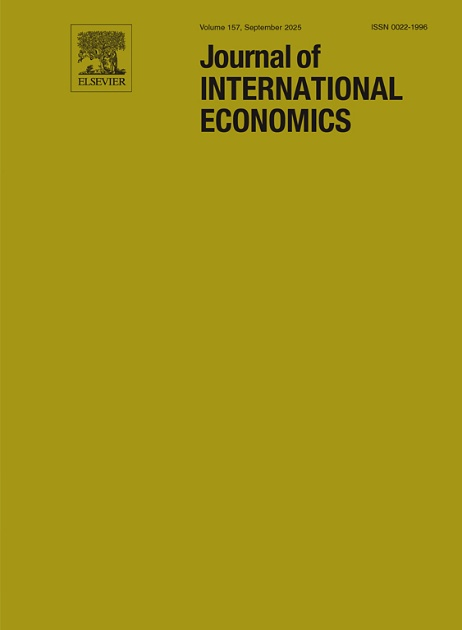Recently, a paper titled“A Swing-State Theorem, with Evidence”, co-authored by Professor Ma Xiangjun of the China Economic Research Institute at Liaoning University as the first author, has been accepted by the Journal of International Economics, a top-tier journal in the field of international economics.
This paper marks the 14th publication in recent years by faculty members of the School of Economics at Liaoning University in leading international journals across various fields of economics, following appearances in journals such asReview of Economics and Statistics(1 paper by Yu Miaojie),Journal of Development Economics(1 paper each by Yu Miaojie, Yin Lijuan, and Yang Guohao),Proceedings of the National Academy of Sciences of the United States of America(1 paper by Qiu Huanguang),Journal of Public Economics(1 paper by Chen Feng),Journal of Economics & Management Strategy(1 paper by Gao Ming),Journal of Labor Economics(1 paper by Yang Zhe),Journal of Economic Theory(1 paper by He Chao),Journal of Human Resources(1 paper by Zhou Yu),Journal of Monetary Economics(1 paper by Wang Xiaowen), and Journal of Environmental Economics and Management(1 paper each by Yang Zhe and Chen Feng).As a landmark achievement under the “Double First-Class” initiative, this accomplishment demonstrates yet another significant advancement in the production of high-level research outputs within Liaoning University’s Applied Economics discipline.
Paper Summary
In U.S. political elections, the two major parties compete for swing-state votes by designing policies that favor industries concentrated in those states. While voters pay attention to the parties’ campaign platforms in a given year, they are also influenced by the long-standing political and cultural environment of their states, which explains why certain states (so-called “red states” or “blue states”) are reliably won by one party (Republican or Democratic). However, some states remain highly competitive and often shift between parties, becoming the key battlegrounds—swing states.
This paper develops a theoretical model to derive a generalizable“Swing-State Theorem,”which demonstrates that electoral competition between the two parties leads both to design optimal trade policies that maximize the welfare of swing-state residents. Building on this, the paper takes trade policy as a case study, constructing a structural model and conducting empirical analysis to test the theory.
Using U.S. presidential and Senate election data, the study examines three major trade policy shocks: 1. The Most-Favored-Nation (MFN) import tariffs determined in the 1996 Uruguay Round; 2. U.S. import tariffs on Mexico in 1993, the year prior to the implementation of the North American Free Trade Agreement (NAFTA); 3. The additional tariffs imposed on multiple countries and a wide range of goods during the 2018–2019 U.S.–China trade war, on top of existing MFN tariffs.
Empirical results show that, in terms of tariff protection, the welfare weight of residents in non-swing states is only about 82% of that of swing-state residents. Moreover, the estimated degree of policy bias toward swing states is significantly higher than what is suggested by the classic “Protection for Sale” model.
Journal Introduction

TheJournal of International Economics(JIE), founded in 1971 and published by Elsevier, is widely recognized as a leading international academic journal in the field of international economics. It enjoys broad scholarly influence and is regarded as one of the top journals in the discipline.
Author Biography

Professor Ma Xiangjun is a Professor and Ph.D. supervisor at Liaoning University, where he serves as Deputy Dean of the China Economic Research Institute and Deputy Dean of the School of Finance and Trade. She holds a Ph.D. in Economics from the University of Virginia and a bachelor’s degree from Renmin University of China.
Professor Ma previously served as an Associate Professor at the University of International Business and Economics, an Economist/Manager specializing in transfer pricing at Deloitte Tax LLP in Silicon Valley, a Visiting Scholar at the National School of Development at Peking University, and a seconded official at the Department of WTO Affairs of the Ministry of Commerce of China.
Her research interests include international trade, international taxation and multinational corporations, political economy, and applied microeconomics. Her work has been published in leading international journals such as theJournal of International Economics. She has served as a sub-project leader for key programs under the National Natural Science Foundation of China (NSFC) and major projects under the National Social Science Foundation of China (NSSFC), and has also directed projects funded by the NSFC Youth Program and the Beijing Social Science Foundation Youth Program.
She teaches courses such as International Trade, Microeconomics, and Principles of Economics. Her teaching excellence has been recognized with multiple honors, including the Second Prize and Best Teaching Plan Award in the Beijing Young Faculty Teaching Competition, the First Prize for Undergraduate Teaching Achievements at Liaoning University, and several awards at the University of International Business and Economics, such as the Excellent Teaching Award, First Prize in the Young Faculty Teaching Competition, and Third Prize in the Micro-Lecture Competition.
